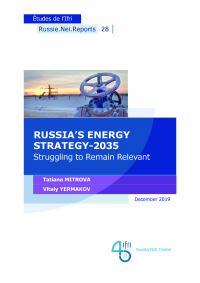Gateway to Think Tanks
| 来源类型 | Publications - Reports - Russie.NEI.Reports |
| 规范类型 | 报告 |
| DOI | 979-10-373-0102-4 |
| Russia’s Energy Strategy-2035: Struggling to Remain Relevant Russie.Nei.Reports, No. 28, Ifri, December 2019 | |
| Tatiana MITROVA, Vitaly YERMAKOV | |
| 发表日期 | 2019-12-10 |
| 出版年 | 2019 |
| 概述 | Russia’s Energy Strategy to 2035 (ES-2035) enters, finally, the home stretch. The Ministry of Energy submitted its version of the document to the Russian Government in early October 2019. |
| 摘要 |
Russia’s Energy Strategy-2035: Struggling to Remain Relevant Russie.Nei.Reports, No. 28, Ifri, December 2019
Russia’s Energy Strategy to 2035 (ES-2035) enters, finally, the home stretch. The Ministry of Energy submitted its version of the document to the Russian Government in early October 2019. 
Russia’s Energy Strategy-2035: Struggling to Remain Relevant
Download
0.73 Mo
Once approved (this is expected before year’s end), ES-2035 will become the best available indication of Russian energy policymakers’ plans. It therefore merits careful consideration. This paper reviews the key goals, scenarios and indicative ranges for output and consumption contained in ES-2035. It thus contributes to understanding the strategic compromises that Russia might be ready to take, as well as those that are unlikely to be acceptable. Our review of the draft ES-2035 suggests that it provides general guidelines to the future evolution of Russia’s energy sectors, but struggles to remain relevant amid fast-paced changes in the global markets. Several crucial but politically sensitive energy issues still need further clarification of policies: the future fiscal regime for oil and gas that could incentivize output and prevent production declines; industrial and technological policy; the choice of the future model for Russia’s gas industry and whether it is going to develop under continued state regulation or in the market environment; climate policy and the strategy to promote (or not) renewables and other technologies of energy transition; and the future of competition in wholesale and retail power markets. Tatiana Mitrova is Director of the Energy Centre, Moscow School of Management SKOLKOVO and Head of the Research Division at the Energy Research Institute of the Russian Academy of Sciences. Vitaly Yermakov is a Senior Research Fellow at the Oxford Institute for Energy Studies.
|
| 关键词 | gas Gazprom Nord Stream 2 Oil Russia |
| URL | https://www.ifri.org/en/publications/etudes-de-lifri/russieneireports/russias-energy-strategy-2035-struggling-remain |
| 来源智库 | French Institute of International Relations (France) |
| 引用统计 | |
| 资源类型 | 智库出版物 |
| 条目标识符 | http://119.78.100.153/handle/2XGU8XDN/416575 |
| 推荐引用方式 GB/T 7714 | Tatiana MITROVA, Vitaly YERMAKOV. Russia’s Energy Strategy-2035: Struggling to Remain Relevant Russie.Nei.Reports, No. 28, Ifri, December 2019. 2019. |
| 条目包含的文件 | ||||||
| 文件名称/大小 | 资源类型 | 版本类型 | 开放类型 | 使用许可 | ||
| couv_rnr28_page_1.jp(30KB) | 智库出版物 | 限制开放 | CC BY-NC-SA |  浏览 | ||
| mitrova_yermakov_rus(745KB) | 智库出版物 | 限制开放 | CC BY-NC-SA | 浏览 | ||
除非特别说明,本系统中所有内容都受版权保护,并保留所有权利。